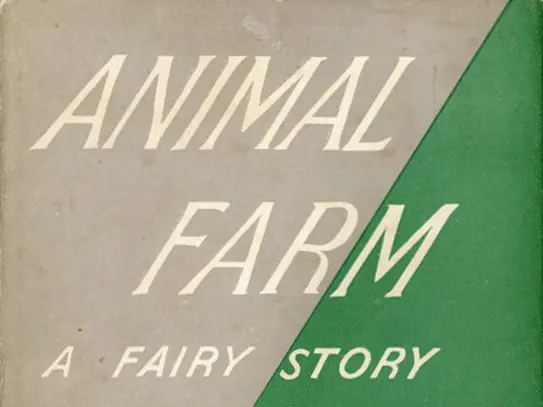Somehow, at the age of 22, I found myself never having read George Orwell’s Animal Farm until a couple weeks ago. I was looking for short audiobooks to catch up on my Goodreads reading challenge when I remembered that it was one of the shortest audiobooks I had saved on my library’s app. All right, I told myself. Let’s see what my high school experience was lacking.
I don’t know what I expected going into the book, but I still found myself surprised when the animals were talking at the book’s beginning. Maybe I thought it would be about an agricultural empire, which wasn’t necessarily wrong, but I definitely thought it would be from a human perspective. As soon as I heard “All men are enemies. All animals are comrades,” I realized how little I knew about this well-known novel.
How Obvious is Too Obvious?
It didn’t take long for me to see how blatantly Orwell was critiquing communism through this short novel. This obviousness on its own ordinarily would have made me dislike it. I’ve been known to disparage works that are too obvious in their agendas because I believe it takes away from their believability. No, I’m not arguing for a realism-only literary world, but I do think characters’ words and actions determine whether readers will stay engaged.
I had to rewire my brain to enjoy Animal Farm. From the first 10 minutes of the audiobook, I understood that I was reading a blueprint rather than a story that would keep me guessing. A cautionary tale. Nuance—the thing I most enjoy encountering in novels—isn’t necessary in cautionary tales. “Duh!” they say. “The point of this entire story is exactly what you think it is.”
Relevance 77 Years Later
The question I always ask myself when reading a novel that’s become a classic is whether or not it’s still relevant. Please don’t take this pretentiously. I’m just wary of the mentality that someone is a better or worse reader based upon the publication dates of the books they choose. However, by the end of this book, I had no doubts about its relevance.

I was talking about Animal Farm to one of my friend’s parents this week, and she said something interesting: “I read it in high school and didn’t really get it. Then, when Jake had to read it when he was in school, I read it with him, and I understood it. I was able to say, ‘Oh yeah, I get what it’s saying.’” That made me pause. Why, I asked myself, are we having high schoolers read this book when many of them aren’t ready for the message it contains? I’m assuming its accessibility is the reason.
On the surface, there’s nothing in the novel that can’t be grasped at the high school level. However, I think that its lesson—that we’re easily deceived and need to have a critical eye when it comes to leadership—is lost on many of the students who are required to read it. It’s later, as we become old enough to vote, leave home, and form our own opinions, that we need Animal Farm. It’s definitely relevant to all of us today, but I think we should be careful with how we handle this relevance.
A Personal Reminder

The temptation I ran into at Animal Farm’s end was to wield it as a weapon. I wanted to tell those I disagreed with politically to read it, believing it was a reminder they needed. It took some time for me to understand that my reaction was problematic. In today’s culture of rapid-fire news articles and the biased writers behind them, everyone needs a little bit of Animal Farm in their system.
It doesn’t matter whether or not someone sides with one political party or another or supports communism. There’s still a lesson for us all in this book that we either escaped high school without reading or skimmed through if it was required.
There’s pressure from every social group today to wave your flag of support in the way your group demands. If you don’t do it, you are at risk of being socially canceled. This is interesting because we, as a culture, like to promote free thinking. Yet, it seems that this thinking needs to conform to whatever groups we choose to be part of. This phenomenon is so influential that algorithms control our social media accounts so we only see what platforms think we want to see.
The result? Polarized camps that believe whatever people within the camp have to say and severely doubt anything people outside it believe. Rather than recommend this book to others as pointed critiques of what they believe, I think each of us would benefit from reading this book as adults and taking an honest look at ourselves.
“Four Legs Good, Two Legs Bad”
This is the mantra repeated by the sheep in Animal Farm, and it’s how we’ve come to view each other as Americans. If you think, look, and act like me: good. Anything outside of that? Bad. The resonance alone between this sentiment and the sheep in the novel is enough to convince me that this book is considered important for good reason. The subject matter or plot line isn’t particularly shocking, but it’s a sharp blade all the same, cutting through the lies we tell ourselves about how well-informed we are or how reliable our sources are. When’s the last time you questioned those who agree with you? Questioned yourself? For me, it’s been too long, and Animal Farm not so graciously reminded me of that.
Although it’s not an overly kind read, I enjoyed Animal Farm in the way you enjoy throwing spinach in your smoothie. You don’t do it because it excites you, but you know it’s good for you. I haven’t become a George Orwell superfan through this experience, but I certainly respect this piece of literature.
